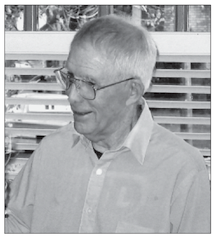Russ Jolley
Last Updated on March 23, 2024 by Tom Pratum

Russell I. Jolley was born in Texas on December 6, 1922. He obtained a BS in Chemical Engineering from Texas A&M. After graduation, he served in the US Navy in the Pacific Theater during World War II. He studied astronomy at the University of Leiden in Holland where he discovered two variable stars, before realizing that astronomy was not his field.
After taking some time to explore Europe, he accepted a position with a chemical company in Idaho. He later earned MS and Ph.D. degrees in biochemistry at Oregon State University. Russ’s initial interest in botany, encouraged by his father during family vacations in Texas and the mountains of the Southwest, intensified when he came to Oregon.
Russ spent his professional career working as a research biochemist at Oregon Health Sciences University and taught chemistry courses at the University of Portland. He first published a survey of wild flowers of the Columbia River Gorge in 1980 and donated the profits to the Native Plant Society.
Each year he updated the list and organized NPSO members to gather information on flowering seasons, elevations, range, and sites. He retired in 1982 to devote full time to the study of the flora of the Columbia River Gorge and to the preparation and publication of his outstanding regional flora, Flowers of the Columbia River Gorge.
He also assisted Nancy Russell in her efforts to protect the Gorge and its flora. Through the years, Russ served as a consultant to the Corps of Engineers, the US Forest Service, the Oregon Department of Transportation (ODOT), and The Nature Conservancy regarding sensitive plants, and delineated areas of special botanical interest worth preserving. Russ was responsible for the revegetation of a five-acre plot along Oregon’s Interstate 84 between Hood River and Mosier.
His field work incorporated excellent ecological and conservation guidelines, and he has continued to monitor and upgrade the revegetated plot over the many years since the initial plantings. He organized action that led to the removal of cattle from state park lands in the wetlands near Rooster Rock. Russ has volunteered his help and recruited others to build fences in the Gorge to protect sensitive flora.
He was responsible for removing cattle from a vernal pond on Dalles Mountain and fencing Catherine Creek to keep neighboring cattle from the property. He has also been instrumental in arranging work parties to eliminate teasel from Alder Creek, working in cooperation with the High Desert Chapter of NPSO (Bend).
The discovery of a rare species of Rorippa on two Columbia River islands saved them from being used for deposition of river spoils. He organized a multi-chapter rescue of Penstemon barrettiae from a gravel pit east of Hood River and replanting of the seedlings at milepost 68 on I-84 with the cooperation of ODOT.
As a member of the Portland Chapter of the Native Plant Society, Russ chaired the Conservation Committee. During that time he prepared some of the best letters I [Fahey] have ever seen in defense of the conservation positions of NPSO. His correspondence was both tightly reasoned and filled with facts in support of his arguments.
His fellow volunteers were urged to build fence in a very rocky terrain to prevent destruction by livestock on the Washington side of the Columbia Gorge. He successfully organized many letter-writing campaigns to remove cattle from Rooster Rock State Park to save the wapato (Sagittaria latifolia).
Russ has published numerous articles in the Native Plant Society Bulletin, the Oregonian, and appeared on Public Broadcasting and Oregon Field Guide programs. His dedication to educating and inspiring fellow members, Boy Scouts, garden club members about the diversity of the Northwest floral wealth has made his name a familiar one to all who care about Oregon’s flora.
– Elizabeth and John King, Nancy Russell, and Michael Fahey, Portland Chapter.
